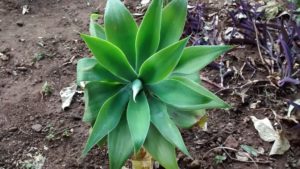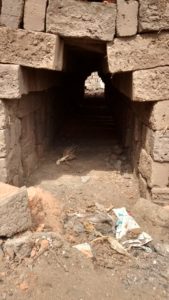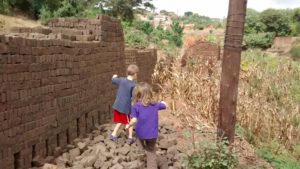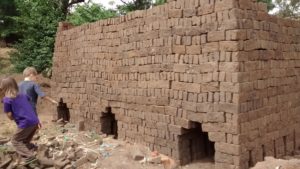I have been digging in the dirt for most of my life. Growing up on a Christmas tree farm with parents who planted a sizeable veggie garden each spring ensured I got plenty of practice pulling weeds, getting dirty and enjoying the fruits of our labor.

Most peo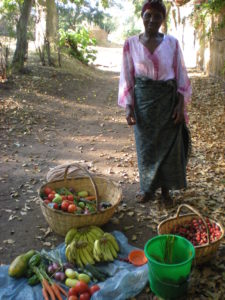 ple in Malawi garden as much land as they can possibly utilize to grow food for their families. Curiously small and narrow strips of soil will be planted with a couple rows of maize (corn) if that’s all that’s available here in the densely populated city. We have not been very successful farming vegetables in our four years year, but delight in supporting other local veggie salespeople. It is just one small way we can support the local economy.
ple in Malawi garden as much land as they can possibly utilize to grow food for their families. Curiously small and narrow strips of soil will be planted with a couple rows of maize (corn) if that’s all that’s available here in the densely populated city. We have not been very successful farming vegetables in our four years year, but delight in supporting other local veggie salespeople. It is just one small way we can support the local economy.
I remember in our first few months here when we first started employing our househelper. I did many tasks alongside her at first to see how she was doing and to direct her in what I expected of her (and to be an example of work to the kids). One day, we worked in the yard sweeping up leaves. As I went around the yard raking, I’d pull weeds if I saw them. All of a sudden, I realized I was being watched — my househelper stopped working, stared at me with a big smile and said:
“Where did you learn how to do that?!?!”
I was stunned at her question.
She was stunned at my ability.
Here I was, a privileged (read “rich”) white American, doing the work of a common laborer. Surely she assumed that I had never needed to work outside in my life. Yet, that is how I grew up – we all pitched in and learned how to work the land, even if in a small way. That is not the picture she had in her mind of me.
Not too long after that we hired a part time gardener who keeps the grass cut, weeds pulled and plants watered (as needed and able). This is a wonderful service to our family! However, a little over a year ago, I realized that I missed working outside. So, I started to work on a small, out of sight plot of our terraced lawn that wasn’t growing anything. We had tried maize our first year – it didn’t do well. We tried other veggies the following year — they didn’t amount to much. It has laid bare since then, eroding away with each rainy season. It was a particularly discouraging time for me (not because of the garden, just life in general). I felt down, unmotivated and a bit depressed. One day, I decided to use some leftover bricks we had from a drainage project to make a path for the kids to explore in the lowest terrace. So, I started planting bricks.
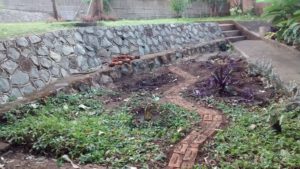 Bricks won’t grow, even if planted (just FYI), but I found great uplifting energy and release in working the land and being outside. I had no need to work outside since we had a gardener, but this was something he was not assigned. After planting bricks in several lines through the triangular shaped plot, I watched how delighted my kids were to follow the paths and play in this otherwise vacant place. I decided to plant something that really would grow – plants. I dug some out of friends’ gardens (with their permission), I bought some, I rearranged what plants we already had.
Bricks won’t grow, even if planted (just FYI), but I found great uplifting energy and release in working the land and being outside. I had no need to work outside since we had a gardener, but this was something he was not assigned. After planting bricks in several lines through the triangular shaped plot, I watched how delighted my kids were to follow the paths and play in this otherwise vacant place. I decided to plant something that really would grow – plants. I dug some out of friends’ gardens (with their permission), I bought some, I rearranged what plants we already had.
I began to feel much better.
God delights in beauty and creativity. I found such release in digging in the dirt, arranging plants and feeding them. I could tell my kids enjoyed it too, and it warmed my heart to see them exploring nature, helping out and being kids.
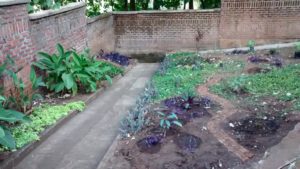 After returning from home ministry, I’ve returned to the garden. I’ve planted more bricks and more plants. My little helpers have taken a deeper interest in God’s creation and appreciate the beauty they discover as they explore plants, insects and animals in our yard.
After returning from home ministry, I’ve returned to the garden. I’ve planted more bricks and more plants. My little helpers have taken a deeper interest in God’s creation and appreciate the beauty they discover as they explore plants, insects and animals in our yard.
I’m calling it a prayer garden right now – modeling it a bit after the one at Roxbury Holiness Camp, for those of you who know it. Maybe I’ll paint Bible verses on big rocks throughout the garden, too! It’s a somewhat hidden part of our property (if no one is climbing on the wall or cutting firewood from trees on the other side of the wall) where you can feel separated from the rest of the world, take a deep breath and listen for God’s voice. Slowly following the brick pathways helps slow down my thoughts and re-center on God. Nature has always been a place where I have felt drawn to God and able to listen. This small piece of it has been a gift not only to me, but to my children as they join in the creative process and notice God in new ways.
Brick making in Malawi
Here’s a little glimpse of where bricks come from in Malawi. They are made of wet dirt packed into a mold, then left out to sun. Some people use them like that (it’s less expensive, but not as sturdy). For fired bricks, they are then stacked, leaving spaces for fires to be lit under. The bricks closest to the fire are worthless because they get too brittle. We stopped by the side of the road where we saw these brick ovens and bought 100 bricks for about $2.00

